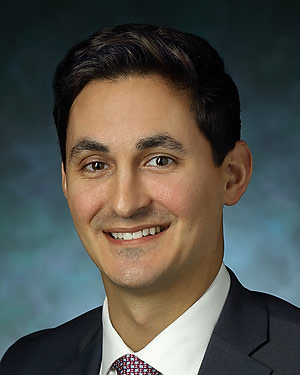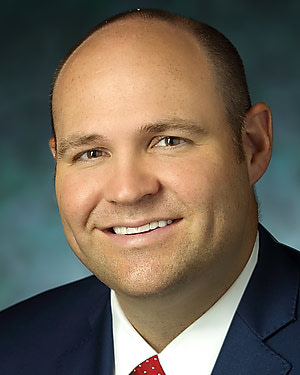-
Matthew Best, M.D.

- Director of Research, Sports Medicine Division
- Surgical Director, Orthopaedics at Greenspring Station
- Team Physician, Johns Hopkins University Athletics
Expertise: ACL Reconstruction, Anterior Shoulder Instability, Arthritis of the Shoulder, Arthroscopic Rotator Cuff Repair, Arthroscopic Surgery
-
Andrew John Cosgarea, M.D.

- The Drew Family Professor of Orthopaedic Surgery in honor of Alec J. Cosgarea
- Head Team Physician, Johns Hopkins University Athletic Department
Expertise: ACL Reconstruction, Arthroscopic Rotator Cuff Repair, Baseball Injuries, Elbow UCL Reconstruction, Knee Meniscus Repair
-
Alex Arden Johnson, M.D.

- Director of Hip Preservation, Johns Hopkins Department of Orthopaedic Surgery
- Team Physician, Johns Hopkins University Athletics
Expertise: ACL Reconstruction, Anterior Shoulder Instability, Arthritis of the Shoulder, Arthroscopic Rotator Cuff Repair, Arthroscopic Surgery
-
John Henry Wilckens, M.D.

- Medical Director for Orthopaedics at White Marsh
- Chief, Division of Sports Medicine, Johns Hopkins Department of Orthopaedic Surgery
Expertise: Baseball Injuries, Orthopaedic Surgery, Platelet-Rich Plasma, Shoulder Labral Tear, Shoulder Surgery
Our team of orthopaedic sports medicine specialists are trained and experienced in treating a wide variety of sports injuries in professional athletes and casual sports enthusiasts, ranging from overuse injuries such as tennis elbow to ACL tears and bone fractures. Our doctors use surgical and non-surgical treatments to get you back in the game safely.
On this page:
Team | Specialty Programs | Treatments and Procedures | Care Locations | Patient Stories
Schedule an Appointment
Schedule online through MyChart
Some services may not be available for online scheduling.
Log into MyChart | Sign up for MyChart
Schedule by phone
Keeping You in the Game
Whether you are a weekend warrior, a sports enthusiast or a career athlete, you deserve the best medical care to keep you achieving your goals. Our team of orthopaedic specialists offer tailored treatments to help you stay in the game you love.
Our Specialty Programs
-
Sports Medicine for Women
Our team in the Women's Sports Medicine Program uses a collaborative approach to support and care for female athletes of all ages and levels of performance.
-
Pediatric Sports Medicine
Our pediatric orthopaedic specialists are specially trained in treating sports injuries and other health concerns in children, whose bodies are still developing.
-
Hip Preservation
Our hip preservation experts offer minimally invasive treatments for hip pain due to hip labral tears, impingement and similar conditions that don't require a hip replacement.
-
Cartilage Regeneration
Our cartilage regeneration experts help patients with chronic knee pain get back to the activities they enjoy, while delaying or eliminating the need for joint replacement.
Treatments and Procedures
Our sports medicine orthopaedic surgeons are experts in a variety of minimally invasive techniques, such as joint arthroscopy, as well as open surgeries and other treatments. Our goal is to help you get back as close as possible to your previous level of sport or activity. Learn more about the procedures we offer for sports-related conditions in our Health section:
Foot and Ankle:
Hip and Knee:
- ACL reconstruction surgery and other types of knee ligament repair
- Hip Arthroscopy
- Meniscus tear surgery
- Surgery to stabilize the kneecap prone to dislocations
Shoulder and Elbow:
- Rotator cuff repair
- UCL reconstruction (Tommy John surgery)
- Repair of labrum tears
- Surgery to stabilize the shoulder prone to dislocations
Other Procedures:
Hear From Our Patients
ACL Tear | Michelle's Story
Elbow Surgery | Michael's Story
Meniscus Tear | Grace's Story
Our Orthopaedic Sports Medicine Experts
Our sports medicine specialists see teens into adulthood. They are specially trained in treating sports-related conditions affecting the bones, ligaments, tendons and joints.
Other Orthopaedic Doctors Who Treat Sports Injuries
-
Edward George McFarland, M.D.

- Wayne H. Lewis Professor of Shoulder and Elbow Surgery
- Director, Division of Shoulder Surgery
Expertise: Arthritis of the Shoulder, Elbow Injuries, Elbow UCL Reconstruction, Orthopaedic Shoulder Surgery, Orthopaedic Surgery
-
Uma Srikumaran, M.D., M.B.A., M.P.H.

- Chair, Johns Hopkins Orthopaedic Surgery at Johns Hopkins Howard County Medical Center
- Director, Shoulder Fellowship
Expertise: Anterior Shoulder Instability, Arthritis, Arthritis of the Shoulder, Arthroscopic Rotator Cuff Repair, Arthroscopic Surgery
-
Nirav K. Patel, M.B.Ch.B., M.D., M.S.

Expertise: Arthroplasty, Avascular Necrosis (AVN) of the Hip, Avascular Necrosis (AVN) of the Knee, Core Decompression for Avascular Necrosis of the Hip, Hip Arthritis
Other Members of the Sports Medicine Care Team
-
Primary Care Sports Medicine
If surgery is not right for you, many conditions can be improved by following a structured rehabilitation plan under supervision of a primary care sports medicine doctor.
-
Rehabilitation Therapy
We work alongside our sports rehabilitation therapists to provide you with a comprehensive recovery plan that accelerates your return to sport.
Insights From Our Experts
Shoulder Injuries | Q&A with Edward McFarland, M.D.
Meniscus Injuries | Q&A with Andrew Cosgarea, M.D.
Dislocated Shoulder | Q&A with Alex Johnson, M.D.








